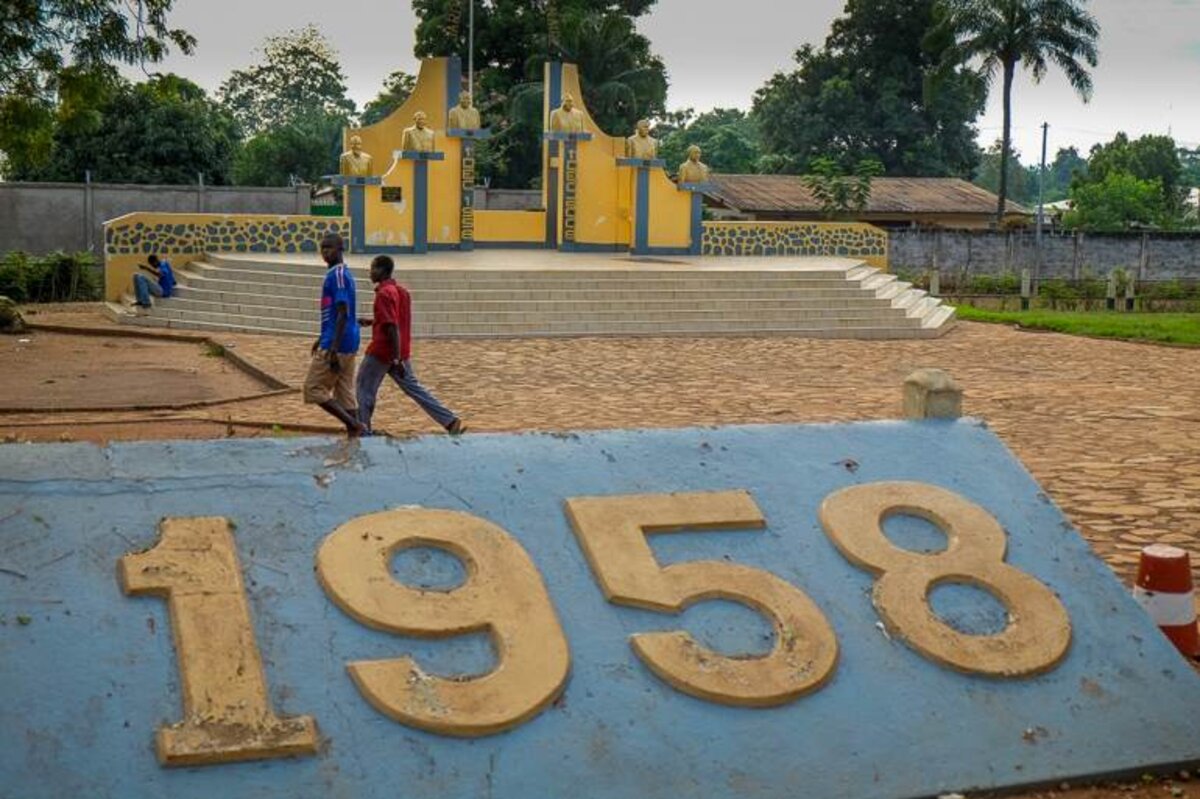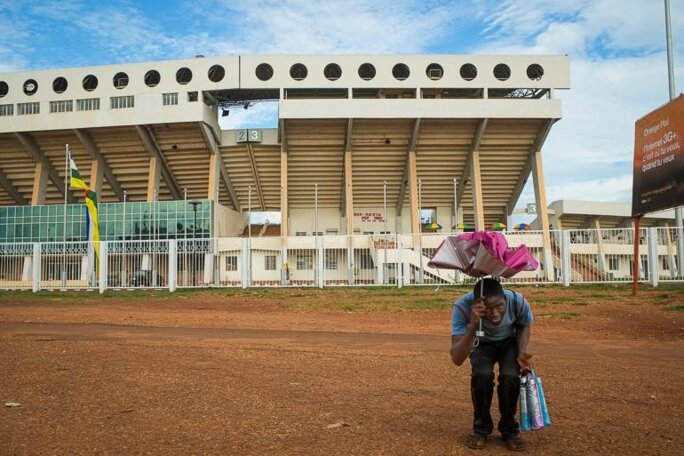From Mediapart's special correspondent in the Central African Republic
The French diplomat knows he is being provocative as he sits back and reflects on the current crisis in France's former colony the Central African Republic. “If we had resolved this crisis the Foccart way we'd have deposed Bozizé [editor's note, the president of the Central African Republic François Bozizé who was ousted by rebels in March 2013] having first reached an understanding with Déby and Sassou, and we'd have avoided the worst!” says the official, on condition of anonymity.
The diplomat is fully aware that in French and African circles one does not talk lightly about the late Jacques Foccart, the controversial former senior advisor to the French government on African affairs under presidents Charles De Gaulle, Georges Pompidou, François Mitterrand and Jacques Chirac. He was a key figure in the creation of the controversial French policy towards Africa known as 'Françafrique', under which close ties with African leaders and the pursuit of business interests became hopelessly intertwined to the detriment of democracy and human rights, and with more than a whiff of corruption. Nor does one trifle with the names of two historical and controversial allies of France in Africa, the current Chad president Idriss Déby and Denis Sassou Nguesso, president of the Congo Republic since 1997.
But the diplomat is determined to make his point; that France's former policy in the continent was not all bad. “We're shooting ourselves in the foot in getting rid of Françafrique in its entirety. We have to get rid of the bad aspects, in other words the suitcases of cash, but keep the relationships with the heads of state.”
Seen from the Central African Republic capital of Bangui, where French troops are now intervening after the green light from the United Nations because of fears of potential massacres, this kind of reasoning seems common sense. Despite its low population and poverty, the Central African Republic has always highlighted the worse kind of interventionism by France towards its former African colonies. There are numerous episodes that highlight this, including Emperor Bokassa's infamous diamonds, which the African leader had given to Valéry Giscard d'Estaing in 1973 before the latter became president of France, to France helping to fund Bokassa's lavish coronation in 1977, and Paris then overthrowing Bocassa in 1979 in Operation Barracuda, a military intervention overseen by Foccart.
From 1980 to 1993 France still largely pulled the strings of power in the Central African Republic, with former intelligence officer lieutenant-colonel Jean-Claude Mantion effectively the 'regent' in the background under two different presidents. The influence of France has remained strong into the 21st century, too, with Paris tacitly approving the coup that brought Bozizé to power in 2003, while the French authorities also supported him against attempts to topple him between 2006 and 2007.

Enlargement : Illustration 1

So it is against this yardstick that one should judge the silence and lack of reaction from Paris when, in March this year, the Séléka rebel coalition, headed by Michel Djotodia, seized control of the country. At the time South African soldiers tried to prevent the coup – South African president Jacob Zuma supported Bozizé – at the cost of thirteen lives. But the 450 French troops who control the airport here did not leave their barracks, something that earned them criticism from worried French expats. It is clear that for several years Bozizé had irritated all his supporters with his clientelism and his refusal to honour agreements reached with the opposition. For all that, Paris did not react.
This inaction was, for some, a sign that “France didn't see it coming and didn't believe the Séléka coalition would win”, as one advisor to Djotodia puts it. For others, and the explanations are not mutually exclusive, the failure to react occurred “because France no longer has an African policy”, to quote the words of Éric Massi,a former Séléka spokesman who is now head of the country's civil aviation authority.
When he was presidential candidate in 2007 Nicolas Sarkozy promised he would end the Françafrique policy. In the end he did not do so, in particular because he allowed members of his inner circle to operate as they wished as they sought to take on the mantle of Foccart, for example his close friend and politician Patrick Balkany and the lawyer Robert Bourgi. Another who became involved in African affairs was the head of the Elysée Palace under Sarkozy, Claude Guéant, who later became his interior minister. He has also been playing a prominent business role in Africa, including in the Central African Republic, since leaving office.
As a presidential candidate François Hollande made the same promise as Sarkozy, and up to now he seems to have kept to it. He got rid of the “Africa unit” at the Elysée and put Pascal Canfin from the Greens in charge of the newly-named development ministry, replacing the old name of ministry of cooperation. Certainly part of the rationale for these changes was a genuine desire to break with past practices, including those carried out under the previous socialist president François Mitterrand. But another factor behind the moves was a lack of understanding and also a lack of interest on the part of President Hollande in Africa. “Or at least until he was forced to intervene in Mali and in the Central African Republic,” says a foreign diplomat in Bangui with a smile.
'If we don't take responsibility for our country others will fill the void'
But the current crisis in the Central African Republic – and the previous one in Mali – nonetheless raise a crucial question: what policy has replaced that of Françafrique? This is not just a philosophical question, for each time a major event occurs in France's former “backyard”, Paris is called upon to help. This leads to a contradiction that is hard to avoid. “When we intervene in a crisis we're accused of neocolonialism,” says the French diplomat cited earlier. “And when we don't intervene we're accused of letting down the Africans!”
When Laurent Fabius visited Bangui in mid-October, the rumour that swept through the capital was that the French foreign minister had come with suitcases stuffed with euros to honour the salaries of civil servants who have not been paid for several months. “Of course it wasn't true but that creates expectations of us,” says another French diplomat.
The recent examples of Mali and the Central African Republic underline this contradiction. A majority of the Malian public applauded France's intervention, and today the majority of people in the Central African Republic want French forces to establish a form of order that African Union troops alone cannot guarantee. Yet they all refuse France a supervisory role or control over their country. The views of Modest Gonga, who runs a non-governmental collective in Bangui, highlight this dilemma. On the one hand he regrets that “the colonising nation did not support us” and yet, immediately complains that “for our leaders what France says assumes more importance that what their own citizens say”. One of Gonga's friends, who runs an association working between France and the Central African Republic, speaks of a “soulless” cooperation between the two nations. “We share a common history with France come what may, but relations remain vague, which is not a good thing,” says the friend.

Enlargement : Illustration 2

The 'Elysée summit for peace in security in Africa' (previously known as the 'Franco-African summit') that took place on December 6th and 7th was intended to be a symbol of a new relationship between France and Africa, of a “relationship based on respect, starting with respect for African institutions”, says Paul Jean-Ortiz, François Hollande's diplomatic advisor. During a press conference to launch the summit, the advisor himself sought to sketch out a “Hollande doctrine” in relation to Africa. “There is no grand document that would define it, but it consists of a real respect for our partners, a respect for the institutions and a dialogue before any decision is taken,” he said.
Several French diplomats with past or present experience of Africa, including one in Bangui, state rather more bluntly: “We have to stop denying that we have relationships, that we speak the same language and that our companies have economic interests in the French-speaking countries of Africa.” That is also the main thrust of a report sent last Wednesday December 4th by former foreign minister Hubert Védrine to finance minister Pierre Moscovici. The report is entitled “A partnership for the future: 15 proposals for new economic development between France and Africa”, and calls for “a reinforcing of France's influence in Africa” and the “re-establishment as quickly as possible of a French overseas economic presence in sub-Saharan Africa”. Of course the question is, how to go about it.
The situation in the Central African Republic, which has long suffered as a result of an umbilical and unbalanced relationship with France, could now provide the opportunity to invent this new relationship, and thus a new African policy, one that the Hollande presidency seems to want. For if Central Africans have been clearly calling for French military intervention, many have now got the message that they are also being called on to take responsibility themselves.
“France must support and advise us,” says Éric Massi. “But it's down to Central Africans to take charge of rebuilding the country.” Similar sentiments are expressed by the director of a local non-governmental organisation, Jean-Mermoz Namyouisse. “If we don't take responsibility in relation to our country, then others, neighbouring countries and France, will fill the void,” he says. It is precisely the lack of responsibility towards one's own country that has led to the current crisis in the Central African Republic.
-----------------------------------------------
English version by Michael Streeter


